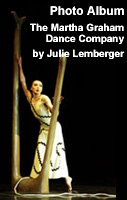











|
Brought to
you by Flash Review 2, 12-16:
Crippled Birds By Jill Emerson What kind of birds are you liable to see in Lise Brenner's "Birdcalls?" Birds with crippled wings that rarely extend. Birds with hunching and tension-inducing osteoarthritis. Birds that polka. "Birdcalls," running through Sunday at Joyce Soho and seen Thursday, isn't literally about birds; in fact, rarely does the choreography reflect flight or soaring or floating feathers. Rather, Brenner's work is the work of a sculptor who teaches her dancers to move like bendy dolls or little old ladies with unusual grace or sometimes blase, limp-wristed cool Joes. "And I See You There Always" was one of the strongest pieces of the night: a duet featuring Georgia Corner and Bruce Jones rarely getting more than a foot apart yet never making eye contact. The dancers' body parts always touched, with the male supporting and manipulating the female. She reached out occasionally, as if wanting to separate. At the very end of the piece she finally left her partner, but there was little leading us up to that moment. I didn't see their relationship change and it felt odd to suddenly watch her leave. The sculpted partnering of the dance made a beautiful display, but because it was danced in silence and had a slow tempo it was out-of-place as the opener. Chris Dohse and Catherine Green were whimsical and obscure in "Tryptich." Green wore a beautiful red tutu and Dohse black jeans and a Hawaiian shirt. They flirted abstractly using squirms, limp limbs and gyrations that carried them to the floor. Much of the kinesthetic details were incredible - a slight itch of the chest to the music of Johnny Cash; a sudden pause mid-phrase as if a synapse was cut; a hip roll as slow as a southern drawl. Unfortunately, the dancers' relationship was as superficial as a flirtation and lacked development. The next dance, the concert's title piece, was smooth and cool, like the silver and white lycra jumpsuits designed by Cristina Ruales. Corner and Jones as well as Johanna Hegenscheidt and Joy McEwen danced to the music of Debussy. Again the movement stopped and started in awkwardly beautiful poses. The dancers never made eye contact and Brenner rarely utilized unison. As a result, the dance was a distant experiment in form that got a little stale. Though the promenades were pleasant and much of the shapes visually striking, as Debussy got more emotional and grand, the choreography flattened (hence, the squeaky floor commanded the most attention). The final piece of the night was the seven-sectioned "Polka Love," in which Catherine Green's solo and Bruce Jones and Dusan Tonek's duet contained some of the most delightful stuff of the whole evening. Polka never looked so good! All of the dancers (also including Hegenscheidt, Matt Jenson, and McEwen) exuded great polka-inspired spirit. The piece lost a little momentum from section to section, but was enthusiastically hilter-kilter. |
